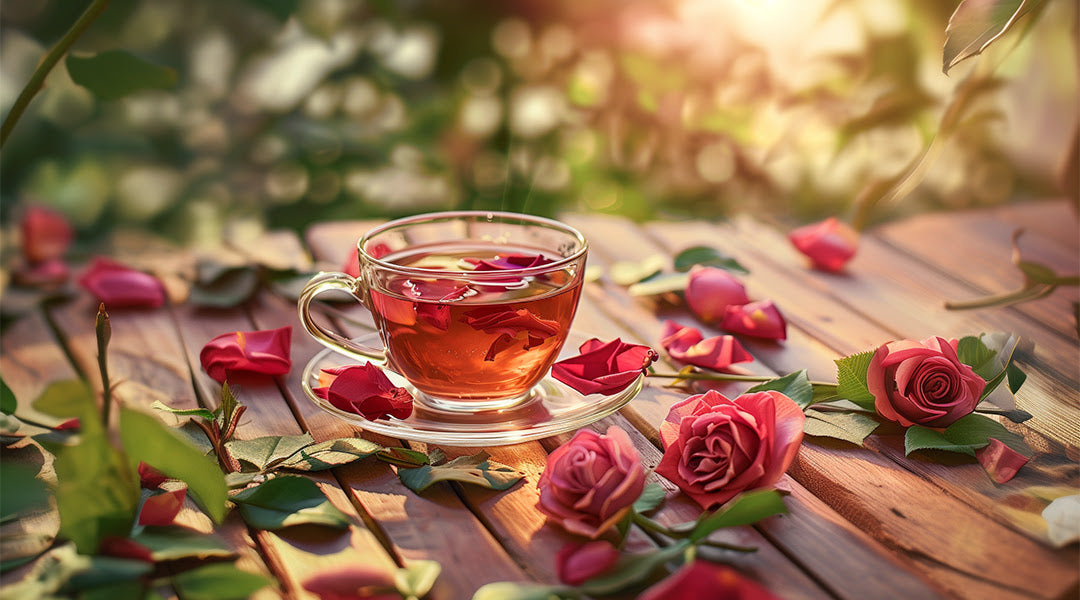
10 Powerful Health Benefits Of Roses - Petals, Tea, & More
At some point in your life, it’s likely that you’ve either given or received roses as a sentiment of shared love, friendship, affection, appreciation, or applause.
Roses are a globally recognized symbol of love, loyalty, achievement, perfection, and even mystery.
They’re one of the oldest flowers, referenced in literature, music, and art for centuries.
But, while roses are one of the most common flowers, these blooms are anything but ordinary.
In Middle Eastern cultures, roses have been used medicinally for thousands of years, aiding in nearly every aspect of whole body health and wellness.
And now, the rest of the world is also realizing the fact that this beautiful flower can bring far more benefit to the world than sheer beauty!
So today, we’re going to explore these rewards, looking beyond the beauty into the wealth of benefits this flower has to offer!
10 Health Benefits Of Roses
There are many benefits to be received from roses. And, because of these health-enhancing qualities, roses are considered a medicinal herb.
Nearly all parts of this powerful plant are medically beneficial, including the petals, rose hip, stem, leaves, and even the root.
Some of these components are used to extract essential oils from the plant, while others are made into a powder or used whole.
Each of these elements contain vitamins, minerals, polyphenols, other antioxidants, and more, which (alone or combined) are then used to make teas, waters, body-care products, supplements, flavorings for beverages (such as coffee), and other items.
While Middle Eastern and West Asian countries have been using rose petals and hips for flavoring (and health benefits) in foods and beverages for years, this is a newer trend here in the states, one that’s gained great popularity in the last 7-8 years.
Since 2017, there’s been a 43% increase in rose-infused items on restaurant menus, and from 2017-2021 alone there were nearly 1,500 new rose flavored products introduced for consumption.
To some, roses may sound like an odd item to use for flavoring coffees, teas, etc. but this floral is similar to others in that its flavor closely mirrors the flower’s scent.
Some varieties of roses can have a strong floral aroma, but overall the taste has been aptly described as “sweet, with subtle undertones ranging from fruit, to mint, to spice.”
However, there is cause for caution when it comes to consuming parts of the rose as well as any other flowering plant:
- In the case of other typical garden florals, some of these can be poisonous. In other words, it’s not advisable to simply pluck petals or leaves from just any flower and sample them.
- There are a few risks that come with consuming rose petals or rose infused products such as:
- Those suffering from rose or rose hip allergies should avoid beverages with roses and rose flavoring.
- Some have found rose tea to negatively interact with medications like blood thinners and antidepressants.
- Consuming an overly abundant amount of rose petals or rose infused coffee, tea, or water could cause diarrhea, nausea, or heartburn due to ingesting too much vitamin C.
- When using various parts of the rose for medicinal or edible purposes, always make sure that the plant hasn’t been sprayed with herbicides, fertilizers, or pesticides as these harsh chemicals are toxic and very harmful to your health.
For those plants, however, that have been grown organically, sustainably, and with health in mind, here’s some of the most powerful ways this stunning beauty can bring benefit to your life and health!
1- Reduces Inflammation

And, many physicians have found that reducing inflammation throughout the body is crucial in preventing such conditions.
Rose petal tea, in particular, has been studied for its benefit to the body in reducing inflammation.
In fact, this flower’s ability to reduce inflammation has been so profound that some studies have found powdered rose petals to be equally as effective in relieving pain (due to inflammation) as popular pain-relieving drugs such as aspirin or ibuprofen.
Sipping rose tea, due to its anti-inflammatory properties, has even been known to eliminate pain from arthritis and physical injury.
Even better, rose petals (barring any individual allergies) don’t come with the dangerous side effects these conventional pain relievers can potentially have.
2- Eases PMS Symptoms

3- Reduces Stress, Enhances Mood
For centuries in Middle Eastern cultures, inhaling the fragrant aroma of roses, specifically when steeped in tea, has been a routine, proven, antidote for relieving stress and improving one’s overall mood.
But, studies have shown this anxiety-relieving benefit doesn’t stop with the pleasant aroma of roses.
When sipping rose petal infused teas, the aromatic benefits are amplified, providing vitamins and antioxidant support which has been proven to be effective at combating stress, tension, and anxiety, as well as promoting feelings of calmness, even aiding in getting a restful night of sleep.
The oils extracted from roses have been shown to support healthy nervous system function, including improving the release of dopamine, a neurotransmitter that is associated with feelings of happiness, pleasure, and feeling good.
Rose tea has even been used in meditation practices due to this flower’s ability to bring calmness and feelings of relaxation.
4- Aids Digestion

5- Supports A Healthy Immune System
Earlier we mentioned that roses are packed with vitamins, minerals, and antioxidants. Well, one of the most abundant vitamins found in rose petals is vitamin C.
The vitamin C content in roses, when consumed, boosts your body’s ability to produce white blood cells which help to fight infections.
The antioxidant content of roses also provides support for your immune system.
Many studies have found antioxidants to significantly improve immune responses, especially when coupled with Vitamins C and E, all of which are abundant in various components of this magnificent flower.
6- Balances Blood Sugar

7- Boosts Skin Health

Rose petal tea!
Most teas infused with rose petals are caffeine free, so this beverage, minus the addition of sugar, is a hydrating, vitamin infused, calming, healthy remedy even for your skin.
Rose water and rose infused facial oils and cleansers are increasing in popularity as they bring acne-clearing, moisturizing, antioxidant support for your skin externally, but consuming rose tea allows these benefits to be experienced from the inside-out.
As we age, our skin loses elasticity, it dulls, and fine lines and wrinkles become more prevalent.
8- Reduces Risk Of Some Cancers

Research has shown that these plant compounds are able to not only stop the formation of cancer cells but they can also protect your body from “cancer-like changes.”
Other studies have found that rosehip extract can “reduce the proliferation and metastasis of triple negative breast cancer cells,” a type of cancer accounting for between 10-20% of all breast cancers.
9- Boosts Heart Health
Roses are commonly associated with love, and in some cultures, this link is thought to stem from the flower’s protective abilities regarding the heart.
Your liver has a part to play in producing and synthesizing cholesterol, and as roses have been found to influence healthy liver function, some scientists believe this connection translates to the heart as well.
Then, the anti-inflammatory effects of roses also play a role in supporting a healthy heart.
Polyphenols and other antioxidants have long been lauded for their protective and healing measures pertaining to multiple chronic diseases including cardiovascular conditions, as polyphenols serve to lower blood pressure levels in patients with hypertension.
Even the stress reducing effects of rose petal tea may play a role in improving heart health as medical experts have long known the detrimental effects of stress on the heart.
10- Anti, Anti, Anti

But, there are many more “anti” benefits stemming from the various parts of a rose.
Roses possess antibacterial properties.
- Rose extract, in particular, has been shown to effectively treat sore throat and relieve chest congestion thanks to its ability to fight against bacteria.
- The phenolic and flavonoid compounds in roses contribute to their antibacterial abilities.
- Red and yellow rose petals have been shown to have the greatest antibacterial benefits.
Roses also have antifungal properties.
- The antifungal effects of roses are greater than the flower’s antibacterial effects.
- Rose extract has been proven effective in fighting against fungal diseases.
- Extracts of white roses proved to bring greater benefits in fighting fungal infections.
Roses have antimicrobial properties.
- Antimicrobial properties differ from antibacterial and antifungal abilities in that this benefit of the rose aids in fighting a range of substances including bacteria, fungi, viruses, and parasites.
- Studies concerning rose water found that the flower’s antiseptic properties contributed to the plant’s ability to treat and prevent infection.
- Rose bud extract and rose petal extract have been studied for their ability to cure infections in the gut and on the skin (due to antimicrobial and antibacterial properties).
Roses are loaded with antioxidants!
- Many of the benefits above stem from the antioxidant content of roses.
- The polyphenols and antioxidants in roses protect your body against free radical cell damage, which aids in your body’s ability to fight against disease, slows aging, boosts skin health, slows cognitive decline, and more.
Lifeboost Champagne Bliss Tea

- Reduced inflammation
- Improved blood sugar levels
- Less pain
- Improved moods
- Reduced stress
- Relaxation
…and more, as you already know from the extensive list covered here today.
So, perhaps Shakespeare had it right all along… “Of all the flowers, methinks a rose is best.”
Check out Lifeboost Coffee Empire State Sunrise Tea.

Becky is a mother, educator, and content writer for Lifeboost Coffee. She has had three years’ experience as a writer, and in that time she has enjoyed creatively composing articles and ebooks covering the topics of coffee, health and fitness, education, recipes, and relationships.
- https://www.bbg.org/article/rose_water
- https://bouqs.com/blog/roses-meaning-symbolism-what-roses-signify/#
- https://www.southsideblooms.com/what-are-the-5-most-common-flowers/#
- https://swadeshivip.com/blog/history-of-rose-tea-is-it-a-good-choice-for-your-health/#
- https://swadeshivip.com/blog/history-of-rose-tea-is-it-a-good-choice-for-your-health/#
- References for the article to confirm data and information.










